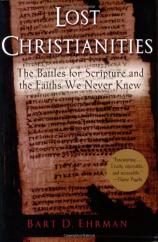Lost Christianities: The Battle for Scripture and the Faiths We Never Knew
Review
Lost Christianities: The Battle for Scripture and the Faiths We Never Knew
Those who decry the fragmentation of contemporary Christianity into so many denominations and sects would do well to take notice of Bart Ehrman's carefully chosen title --- LOST CHRISTIANITIES, plural. As much as we'd like to believe that early Christians worshiped in unity and held to a unified doctrinal viewpoint, historical evidence indicates otherwise. The faith of the followers of Christ in the first three centuries took such diverse paths that even those denominations that seem to be polar opposites today have far more in common than some of the Christian sects that flourished in the early years of the church.
Due in part to the rapid and widespread growth of Christianity but without a corresponding improvement in communication, local churches were at the mercy of a host of influences and a diversity of beliefs about God, Jesus, and the interpretation of apostolic teaching. Numerous writings, most of which were later omitted from the New Testament canon, were considered authentic and true representations of the teachings of Christ.
That diversity of belief gave rise to sects like the anti-Jewish Marcionites, who dismissed the Old Testament as irrelevant, loved the writings of Paul, and believed Jesus did not have a flesh-and-blood body; the Ebionites, who considered Paul a heretic and believed Jesus was born of the sexual union of Joseph and Mary, later to be "adopted" by God as His son to fulfill His mission; and the Phibionites, who allegedly engaged in orgiastic and cannibalistic activities, though the accounts of those activities are highly suspect. Those are just three examples of the numerous sects that flourished at the time, all of which Ehrman examines in fascinating detail.
Ehrman, of course, also gives plenty of ink to the non-canonical writings, many of them a part of the now well-known collection of Gnostic literature. Because the canon had not been established, these writings were widely read and circulated and considered by many Christians to be just as authoritative as the books we now have in the New Testament. That created a fair amount of conflict when the bishops of the church began meeting in the fourth century to try to sort out all the divergent views and to separate the "correct" writings from the obvious and not-so-obvious forgeries as well as the writings that were authentic but expressed views that the bishops considered unorthodox.
There are plenty of other books on the market now that offer a glimpse into the somewhat complicated world of early Christianity. But what sets LOST CHRISTIANITIES apart is Ehrman's ability to convey such an abundance of historical information in such an enjoyable way. As an academic --- Ehrman is the chair of the religious studies department at the Chapel Hill campus of the University of North Carolina --- he provides a thorough overview of what it meant to be Christian in the three centuries immediately following the resurrection without ever lapsing into a dry, scholarly (also known as "boring") mode. Throughout, he speculates on a series of "What if?" questions ("What if the Marcionites had had their way?" and the like), eventually drawing the conclusion that had one of the more peculiar expressions of Christian faith become the dominant one, Christianity itself would be little more than a footnote in today's history books. Some believers may have their most cherished notions about the early church rocked to the core, but in reality there's nothing here that should threaten anyone's faith.
If you're looking for a single book that pulls together an enormous amount of information on the early years of Christianity and presents it in a highly readable and entertaining way, you'd be hard-pressed to find a book that surpasses LOST CHRISTIANITIES.
Reviewed by Marcia Ford on September 15, 2005
Lost Christianities: The Battle for Scripture and the Faiths We Never Knew
- Publication Date: September 15, 2005
- Genres: Christian
- Paperback: 320 pages
- Publisher: Oxford University Press, USA
- ISBN-10: 0195182499
- ISBN-13: 9780195182491




